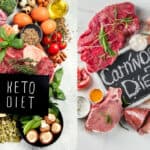The Role of Fats in the Keto Diet: Good Fats vs. Bad Fats
When it comes to the keto diet, understanding the role of fats is crucial for success. In this article, we’ll dive into the world of good fats and bad fats, and how they impact your keto journey. We’ll also provide specific answers and solutions to common questions people have about fats in the keto diet. So, let’s get started!
What is the Keto Diet?
Before we dive into the role of fats, let’s briefly discuss what the keto diet is. The ketogenic diet, or keto diet for short, is a low-carb, high-fat diet that aims to shift your body’s primary fuel source from carbohydrates to fats. This metabolic state is called ketosis, and it’s achieved by drastically reducing your carb intake while increasing your fat consumption. The standard keto diet typically consists of 70-80% fats, 20-25% protein, and 5-10% carbohydrates.
Why are Fats Important in the Keto Diet?
Fats play a crucial role in the keto diet for several reasons:
1. Energy source: When you reduce your carb intake, your body needs an alternative source of energy. Fats are broken down into ketones, which your body uses for fuel in the absence of glucose from carbs.
2. Hormone production: Fats are essential for the production of hormones, including sex hormones and stress hormones. A diet rich in healthy fats can help maintain hormonal balance.
3. Brain health: Your brain is made up of about 60% fat, and it needs a constant supply of fatty acids to function properly. A high-fat diet can support cognitive function and overall brain health.
4. Nutrient absorption: Fats help your body absorb fat-soluble vitamins like A, D, E, and K. Consuming healthy fats with your meals can improve nutrient absorption and overall health.
Good Fats vs. Bad Fats: What’s the Difference?
Not all fats are created equal. It’s essential to understand the difference between good fats and bad fats to make the best choices for your keto diet.
Good Fats
Good fats are generally unsaturated fats, which can be further divided into monounsaturated fats and polyunsaturated fats. These fats are considered heart-healthy and can help reduce inflammation, lower bad cholesterol levels, and support overall health. Some examples of good fats include:
1. Avocado: Rich in monounsaturated fats, avocados are a keto-friendly superfood that can help improve heart health and support weight loss.
2. Olive oil: A staple in the Mediterranean diet, olive oil is packed with monounsaturated fats and antioxidants. Opt for extra-virgin olive oil for the most health benefits.
3. Nuts and seeds: Almonds, walnuts, chia seeds, and flaxseeds are all excellent sources of healthy fats and make great keto-friendly snacks.
4. Fatty fish: Salmon, mackerel, and sardines are rich in omega-3 fatty acids, a type of polyunsaturated fat that supports brain and heart health.
5. Coconut oil: Although it’s a saturated fat, coconut oil contains medium-chain triglycerides (MCTs) that are easily converted into ketones, making it a popular choice for keto dieters.
Bad Fats
Bad fats are typically saturated and trans fats, which can contribute to inflammation, raise bad cholesterol levels, and increase the risk of heart disease. Some examples of bad fats include:
1. Processed meats: Sausages, hot dogs, and deli meats are often high in saturated fats and should be limited on a keto diet.
2. Commercially baked goods: Cookies, cakes, and pastries often contain trans fats, which are harmful to your health and should be avoided.
3. Fried foods: Deep-fried foods are typically cooked in unhealthy oils and can be high in both saturated and trans fats.
4. Margarine: Many margarines contain trans fats and should be avoided in favor of healthier fat sources like butter or ghee.
5. Vegetable oils: Some vegetable oils, like soybean and corn oil, are high in omega-6 fatty acids, which can contribute to inflammation when consumed in excess.
How to Choose the Right Fats for Your Keto Diet
To ensure you’re consuming the right fats on your keto diet, follow these tips:
1. Focus on whole foods: Choose whole, unprocessed foods like avocados, nuts, and fatty fish to get the majority of your fats.
2. Read labels: Check food labels for hidden trans fats and choose products with the least amount of saturated and trans fats.
3. Use healthy cooking methods: Opt for baking, grilling, or sautéing instead of frying to limit your intake of unhealthy fats.
4. Balance your omega-3 and omega-6 intake: Aim for a balance of omega-3 and omega-6 fatty acids by consuming fatty fish and limiting vegetable oils high in omega-6s.
5. Consult a healthcare professional: If you’re unsure about your fat intake or have specific health concerns, consult a healthcare professional for personalized advice.
For more information on healthy fats and their role in the keto diet, check out these resources from the Harvard T.H. Chan School of Public Health and the American Heart Association.
Conclusion
Understanding the role of fats in the keto diet is essential for success. By focusing on good fats and limiting bad fats, you can support your overall health while achieving and maintaining ketosis. Remember to choose whole, unprocessed foods, read labels, and consult a healthcare professional if you have any concerns. With the right knowledge and choices, you can make the most of your keto journey.


